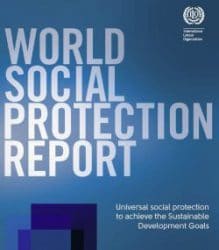Policy highlights:
- This report provides a global overview of recent trends in social protection systems. Although social protection policies have been gaining momentum, only 17.8% of the Sub-Saharan population are covered by at least one social protection cash benefit (globally, that figure is 45%), which is often confined to workers in the formal economy (the proportion of unemployed persons receiving benefits is only 5.6%, mainly due to informality and a lack of proper schemes).
- Some upcoming policy fields include social protection in fragile states and social protection for migrant workers. These types of developments require adapting social protection systems to (e.g. demographic) change. Reforms should be designed from a long-term perspective and with the achievement of the SDGs in mind, considering both social impacts and not letting (short-term) fiscal objectives obstruct impact.
- Africa’s demographic dividend is mentioned as an opportunity to increase social protection: a larger working-age population leads to a decrease in demographic pressure, while increased production ratios provide the means to facilitate social protection. However, this is dependent on a country’s ability to increase labour market productivity and decrease informality and un/underemployment.
- Countries have a responsibility to guarantee at least a basic level of social security – a social protection floor. In Sub-Saharan Africa, policies should focus on: 1) extending social protection to informal workers to formalize and improve conditions, 2) developing social assistance schemes for those who cannot work, 3) implementing universal health coverage systems, 4) reviewing national social protection policies that combine non-contributory and contributory schemes, 5) identifying innovative fiscal strategies for increased spending and adequate coverage (levels of social protection benefits are often insufficient to bring people out of poverty and insecurity), 6) strengthening and improving legal and regulatory frameworks, 7) strengthening capacity and institutions, and 8) enhancing resilience to climate and other shocks, integrating resilient livelihoods support, and improving coordination between social protection and emergency response systems.










